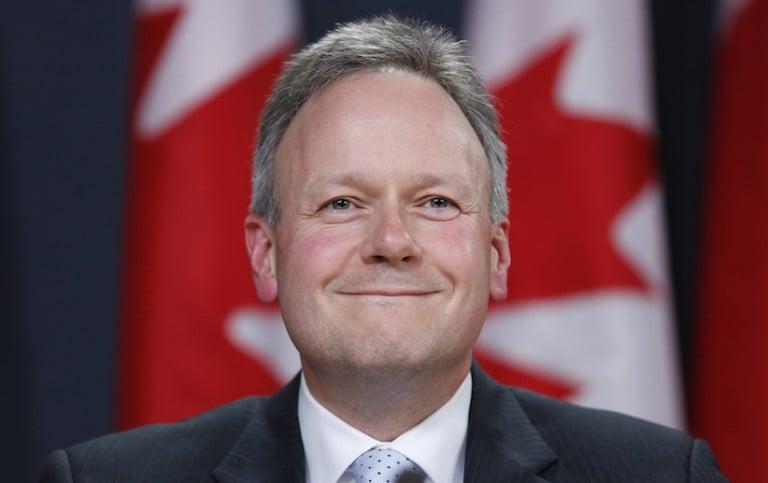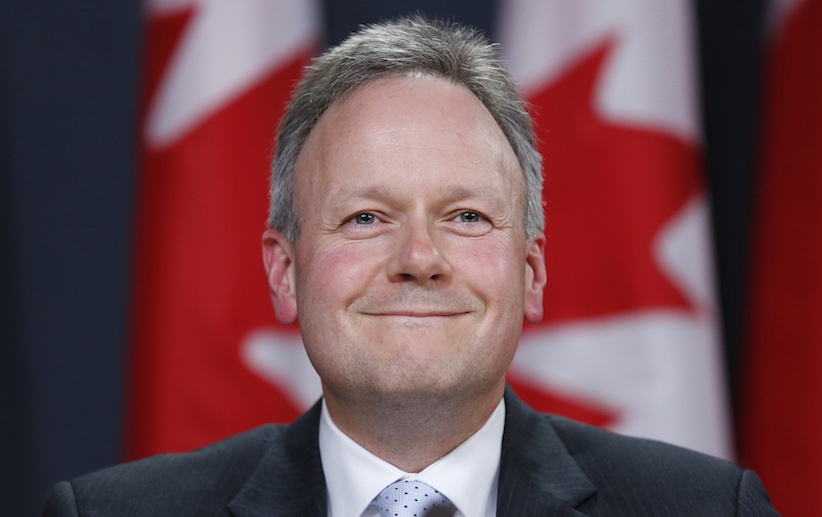Stephen Poloz to corporate Canada: Cheer up
The Bank of Canada governor would like to counter the persistent sense of pessimism in the economy and encourage business to invest once again

Bank of Canada Governor Stephen Poloz smiles during a news conference in Ottawa in 2013. REUTERS/Chris Wattie
Share

Bank of Canada governor Stephen Poloz is known for speaking in metaphors. He has used hockey cards to explain the wealth effects of spikes in energy prices, and simmering spaghetti sauce to describe the response of central banks to the financial crisis. His best one, he says, is an image he constructed recently to counter the notion that ultra-low interest rates are doing nothing for the economy. “The idea that policy has stopped working, I think, is a bit odd,” Poloz said over the weekend. “My metaphor of riding a bike up a hill is probably one of the best ones I have ever had. Everybody understands that if you are riding a bike up a hill and you stop pedalling, you are going to notice the outcome right there. You probably are just going to fall over.”
Unfortunately, the Canadian economy is a long way from being ready for the Tour de France. Poloz and the other members of the Bank of Canada’s Governing Council dropped the benchmark lending rate to 0.5 per cent in July 2015, matching the lowest level on record. The results have been disappointing. The International Monetary Fund predicted last week that Canada’s gross domestic product will expand only 1.2 per cent in 2016, one of the weaker rates of growth among the world’s richer economies. That’s partly because of the collapse in oil prices, and partly because non-energy exports have been unresponsive to the rocket fuel of cheap money and a weaker exchange rate.
There is nothing the Bank of Canada can do about the international oil price, but it is supposed to be able to pull some levers to get Canadian companies to spend some money. Instead, corporate Canada is sitting on more than $500 billion of cash that is earning next to nothing in interest. “We still believe in the fundamental story,” Poloz told a small group of Canadian journalists in Washington on Oct. 8, referring to the central bank’s years-long belief that exports and business investment will take over from household spending and oil exports as the drivers of economic growth. “Are we disappointed by the rate at which that thing is coming true? Absolutely.”
But just as he sought novel ways to explain why he thinks monetary policy still is working, Poloz is seeking a way to describe Canada’s frustratingly slow economic growth while keeping the public from fixating on the negative. “The situation continues to be okay,” he said. “We are creating jobs. Growth is low, but it’s not zero, it’s moving. The U.S. economy is solid.”
Poloz was in Washington for the annual meetings of the IMF and World Bank, where disappointment was the theme of almost every talk about the economy. Christine Lagarde, the fund’s managing director, warned policy-makers they risked condemning the world to a “new mediocre,” a steady state that will produce far less wealth and deliver far fewer people from poverty than would be the case if politicians only would try a little harder. The IMF predicted the global economy will grow 3.4 per cent in 2017, uninspiring by historical standards. (World GDP expanded by more than five per cent in 2010 and exceeded four per cent in 2011.)
The world’s smartest economists think they have the problems surrounded, even if they don’t quite know what to do about them. Populations are aging, reducing the number of available workers to help generate wealth and altering consumption patterns as households save more for retirement. Productivity is weak, as is business investment. Trade is growing slower than the global economy itself, a reverse of the situation of the pre-crisis years when growth was booming. The IMF has consistently revised its forecasts lower, as its economists struggle to understand these new dynamics. That has fed a consistent malaise that weighs on confidence.
Poloz would like to counter the persistent sense of pessimism. He accepts that uncertainty is high and that executives are wary. “There are lots of things they could be waiting to see,” he said in Washington. “Some of them might be political. Okay, that’s fair game, that’s real money. You don’t make casual bets with real money.” Yet it is fair to say that Canadian business leaders are behaving at least a little bit like chickens. “Uncertainty,” to some extent, appears to have become an excuse for inaction. The IMF in its latest economic outlook raised the possibility that “feedback mechanisms” —the constant refrain about weak demand and productivity—could be discouraging companies from investing. Last month in Quebec City, Poloz gave a speech in which he said Canadian executives must readjust their expectations of future profits to a world where slower economic growth will be the norm. His point: while returns on investment are lower today, surely they are better than earning nothing at all?
The Bank of Canada is scheduled to release its next quarterly report on the economy later this month. The central bank probably will cut its outlook for growth this year and extend the time it thinks it will take to get back to a place where the economy is operating at its full potential. Exports slumped earlier this year, along with an unexpected slump in U.S. demand. After the Bank of Canada’s last policy meeting in September, it warned the things hadn’t turned out as expected. “The U.S. is not weak, it just had a bit of a lull there,” Poloz said. “It will take a while before we can tell that complete story. One of the things is investment. If investment in the U.S. is always going to be lower, which is one interpretation that could be true, you would have to say the our exports always will be lower too.”
But that’s speculative—it is too soon to know what is going on in the U.S., which continues to create jobs at an impressive rate. What Poloz says he knows for sure is that the Canadian economy is about to get a “quite significant” jolt from Prime Minister Justin Trudeau’s enhanced family benefit program. Trudeau’s infrastructure spending also is about to hit the economy. Poloz said he was “heartened” by the central bank’s latest survey of business leaders, which suggests pessimism from the oil-price shock has bottomed.
Expect more emphasis on the good things in the economy. That because feedback mechanisms work both ways, and with interest rates near zero, creating a positive feedback loop might be the most powerful tool the Bank of Canada has at its disposal. “When people see good news, it causes them to look at their own good news in a more reinforcing way,” Poloz said. “That’s a long way of saying that animal spirits tend to be contagious.”